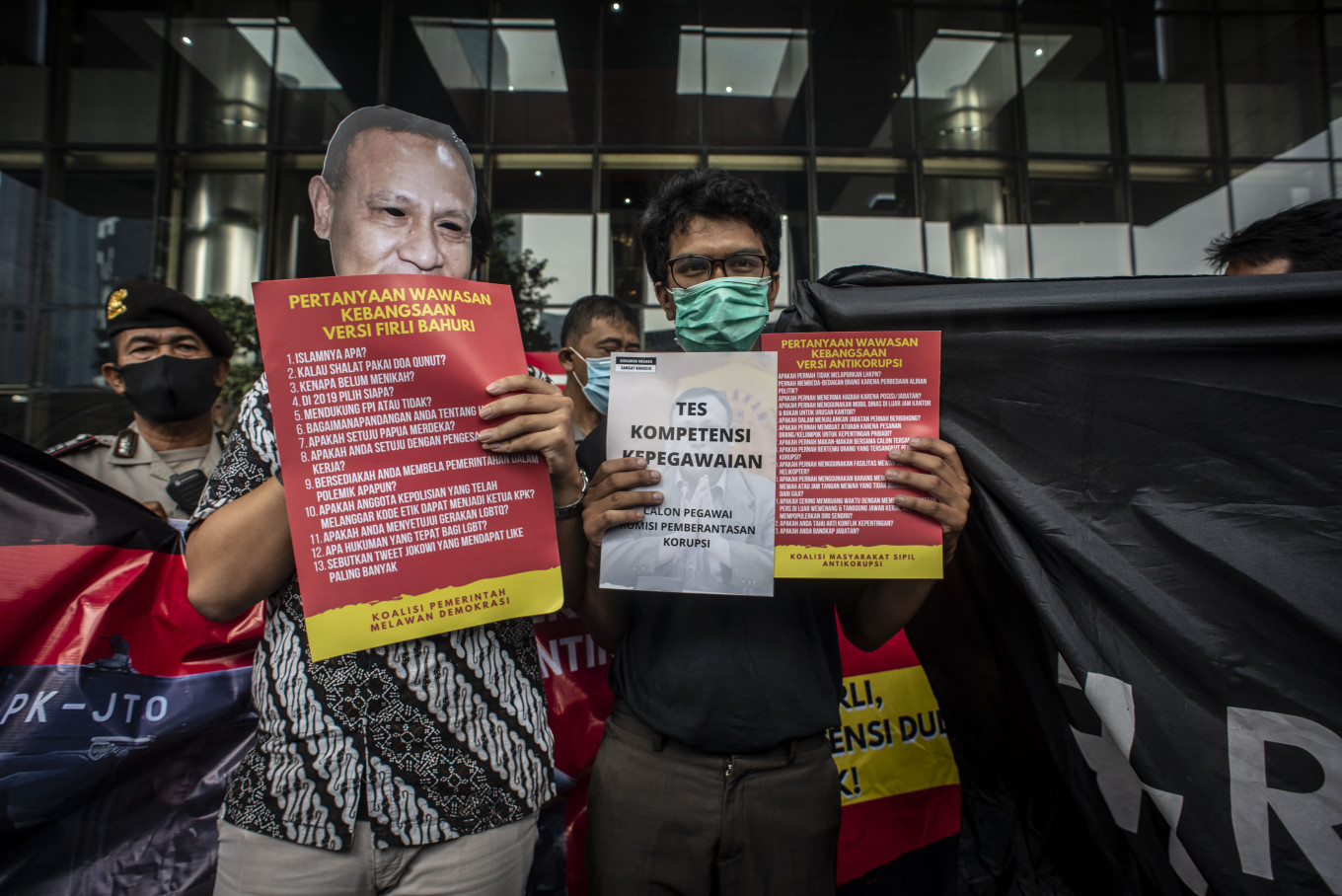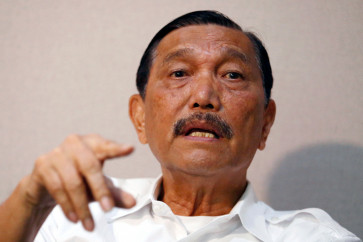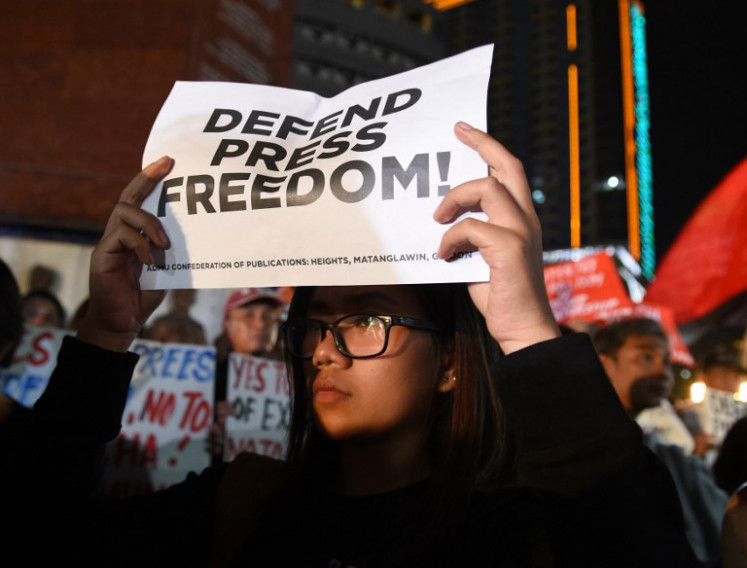Controversial test puts KPK management in spotlight
Assessment test seen as means of undermining graft busters
Change Size

T
he Corruption Eradication Commission (KPK) has come under fire for a controversial assessment test that may lead to several top graft busters being dismissed.
The test, dubbed the civic knowledge test, is part of the employment status requirements within the KPK as mandated by the revised KPK Law that was passed following a speedy deliberation at the House of Representatives in 2019. The law gave the antigraft body a deadline to complete the process by October this year.
On Wednesday, KPK deputy chairman Nurul Ghufron announced that 75 employees had failed the assessment test conducted on more than 1,300 employees. He added that two more employees had failed to show up for their interview session of the test.
The announcement was made days after Koran Tempo published reports on the results of the test, including a leaked list of the 75 employees who reportedly failed the test. It also reported that senior investigator Novel Baswedan was among the employees who apparently did not pass the test and was on the brink of dismissal from the antigraft body.
On the same occassion, KPK chairman Firli Bahuri said the KPK had received the test results from the National Civil Service Agency (BKN) on April 27, but only opened them on Wednesday.
Firli quickly dismissed concerns about the dismissal: “As of today, we have no intention of firing any employees.”
Read also: Top KPK investigators may lose jobs after failing controversial civics test
Religion, ethnicity: Controversial assessment questions
Nurul said that the commission launched a series of assessments between March and April for its employees as part of the employment status transition. The assessment consisted of several stages, namely written test, profiling and interview.
He added that the agency had cooperated with the BKN in conducting the assessments. The latter said it had worked with various institutions to formulate questions for the test, including the Indonesian Military Strategic Intelligence Agency (BAIS TNI), the State Intelligence Agency (BIN) and the National Counterterrorism Agency (BNPT).
The aim of the assessment, Nurul went on to say, was to assess whether an employee possessed key qualities deemed important by the antigraft body, namely integrity, neutrality and antiradicalism.
But the test has been called into question because of several controversial questions deemed discriminating against certain ethnic groups and religious beliefs. Among the questions, which were leaked to the public, was whether someone accused of committing blasphemy should be handed the death penalty, and whether people from certain ethnic groups were “cruel”.
Read also: Alleged misconduct by investigators puts KPK in spotlight
Two KPK employees, who requested anonymity due to safety concerns, confirmed that they were asked those questions during the assessment. One employee said they were asked during the interview whether they would accept a blood transfusion from a donor of a different religion.
“Some of the questions had racist and intolerant [tones] as they were related to Islamic [teachings]. Some of my colleagues who are Christians and Buddhists told me they didn’t understand [the questions],” the employee told The Jakarta Post on Thursday.
Firli declined to disclose the questions used in the assessment during Wednesday’s press briefing, saying simply that they “were drawn up in collaboration with other institutions.”
While the 2019 KPK Law and its derivative government regulation (PP) mandated the antigraft body to change its employees’ employment status to that of civil servants, the regulations did not specifically require any parties to hold civic knowledge tests as part of the transition process.
The requirement for employees to take such civic tests is only stipulated in a KPK regulation signed by the chairman himself in January.
‘Justification for dismissing some employees’: Critics
A KPK investigator who requested anonymity told the Post that he believed the regulation was an “unnecessary procedure” beyond the mandates of the KPK Law and the PP.
“KPK employees have gone through several tests during their admission to the agency. Some have even been recognized for their distinguished [services]. Why do they need to go through another test?” the investigator said.
The investigator further said he had received confirmation from colleagues that top graft buster Novel Baswedan and KPK workers union body head Yudi Purnomo Harahap were among the list of people who reportedly failed the assessment.
Firli declined to confirm the authenticity of the leaked names, saying the KPK leadership only learned about the assessment results on Wednesday.
Anticorruption watchdogs have slammed the KPK for the test, calling it a part of the ongoing efforts to weaken the antigraft body. They alleged current KPK leaders could fire anybody deemed as not being in line with them using the assessment as a pretext.
Researcher Charles Simabura of Andalas University’s Center for Constitutional Studies said using the assessment as a pretext to fire KPK employees might go against a recent Constitutional Court ruling.
Read also: 2021 will be a 'make' year for the KPK – with collaboration
On Tuesday, the court ruled in favor of Indonesian Islamic University (UII) lecturers who filed a judicial review petition against the revised KPK Law. While the justices upheld a provision requiring all KPK employees to change their status to that of civil servants, they added a provision requiring that the procedures for such a transition should not be detrimental to the employees’ rights.
“Firing employees for failing the civic knowledge test might be deemed unconstitutional based on the court’s ruling,” Charles said. “We urge the KPK leaders to be careful [in deciding upon the matter] because we suspect this is an abuse of power as part of efforts to weaken the commission.”
While the KPK confirmed on Wednesday the results of the assessment, the fate of the 75 employees who failed the test remains unclear. KPK secretary-general Cahya Harefa said the employees were expected to carry out their duties as usual until the Administrative and Bureaucratic Reform Ministry and the BKN had come to an agreement as to their status.
Administrative and Bureaucratic Reform Minister Tjahjo Kumolo said the ministry would have a discussion with the BKN to follow up on the matter. BKN chairman Bima Haria Wibisana did not respond to the Post’s requests for a comment on the issue.









